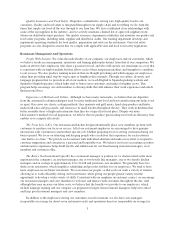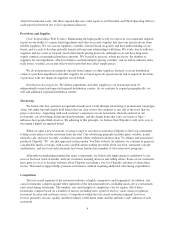Chipotle 2006 Annual Report Download - page 19
Download and view the complete annual report
Please find page 19 of the 2006 Chipotle annual report below. You can navigate through the pages in the report by either clicking on the pages listed below, or by using the keyword search tool below to find specific information within the annual report.new restaurants, which could delay planned restaurant openings. In addition, stringent and varied requirements of
local regulators with respect to zoning, land use and environmental factors could delay or prevent development
of new restaurants in particular locations.
We are subject to the U.S. Americans with Disabilities Act and similar state laws that give civil rights
protections to individuals with disabilities in the context of employment, public accommodations and other areas.
We may in the future have to modify restaurants, for example by adding access ramps or redesigning certain
architectural fixtures, to provide service to or make reasonable accommodations for disabled persons. The
expenses associated with these modifications could be material.
Our operations are also subject to the U.S. Fair Labor Standards Act, which governs such matters as
minimum wages, overtime and other working conditions, along with the U.S. Americans with Disabilities Act,
family leave mandates and a variety of similar laws enacted by the states that govern these and other employment
law matters. Several states in which we operate have recently enacted minimum wage increases, and these
increases, as well as proposed federal minimum wage increases, could increase our labor costs.
In recent years, there has been an increased legislative, regulatory and consumer focus at the federal, state
and municipal levels on the food industry including nutrition and advertising practices. Restaurants operating in
the quick-service and fast-casual segments have been a particular focus. For example, the New York City Board
of Health has adopted a regulation requiring that restaurants that make calorie information publicly available
must include that information on their menus and menu boards. We may in the future become subject to other
initiatives in the area of nutrition disclosure or advertising, such as requirements to provide information about the
nutritional content of our food, which could increase our expenses.
We are subject to federal, state and local environmental laws and regulations concerning the discharge, storage,
handling, release and disposal of hazardous or toxic substances, as well as local ordinances restricting the types of
packaging we can use in our restaurants. Many environmental laws applicable to us provide for significant fines,
penalties and liabilities, sometimes without regard to whether we knew of, or were responsible for, the release or
presence of hazardous or toxic substances. Third parties may also make claims against owners or operators of
properties for personal injuries and property damage associated with releases of, or actual or alleged exposure to,
such substances. We cannot predict what environmental laws will be enacted in the future, how existing or future
environmental laws will be administered or interpreted, or the amount of future expenditures that we may need to
make to comply with, or to satisfy claims relating to, environmental laws. We have not conducted a comprehensive
environmental review of our properties or operations. We have, however, conducted investigations of some of our
properties and identified contamination caused by third-party operations. We believe any such contamination has
been or should be addressed by the third party. If the relevant third party does not address or has not addressed the
identified contamination properly or completely, then under certain environmental laws, we could be held liable as
an owner and operator to address any remaining contamination. Any such liability could be material. Further, we
may not have identified all of the potential environmental liabilities at our properties, and any such liabilities could
have a material adverse effect on our operations or results of operations.
We may not be able to adequately protect our intellectual property, which could harm the value of our
brands and adversely affect our business.
Our intellectual property is material to the conduct of our business. Our ability to implement our business
plan successfully depends in part on our ability to further build brand recognition using our trademarks, service
marks, trade dress and other proprietary intellectual property, including our name and logos and the unique
ambience of our restaurants. If our efforts to protect our intellectual property are inadequate, or if any third party
misappropriates or infringes on our intellectual property, either in print or on the internet, the value of our brands
may be harmed, which could have a material adverse effect on our business and might prevent our brands from
achieving or maintaining market acceptance. We may also encounter claims from prior users of similar
intellectual property in areas where we operate or intend to conduct operations. This could harm our image, brand
or competitive position and cause us to incur significant penalties and costs.
13
























